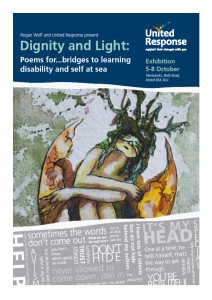 Two new poem collections are about to be uploaded on the website of the project I run, called “Poems for…“.
Two new poem collections are about to be uploaded on the website of the project I run, called “Poems for…“.
One of them is on Learning Disability and is called “Poems for… Bridges to Learning Disability” The other is on mental ill-health and is called “Poems for…Self at Sea“.
The poems in both collections bring together many voices and many years. Some were written in the first person, others from a place of close contact and witness. They constitute an attempt to create a language of real warmth and connection that will break down barriers. I hope that, in time, both collections will be used in schools as part of a teaching package.
The charity United Response worked closely with me on this and we launched the collections in October in Bristol by means of an exhibition.
This took place between October 5th and 8th. The poems were displayed as posters. A rather lovely book of them was (and still is) available as well, produced by United Response.
At the same time, a journalist called Saba Salman uploaded a good piece about the initiative on her blog. She called it “Shattering Stigma with the Power of Poetry.” You can find the piece here.
The exhibition made direct reference to the themes of World Mental Health Day and National Poetry Day, both of which took place in early October. The theme of the first day was Dignity and of the second Light.
A formal launch took place mid-week, compèred by Ali Vowles, of BBC Points West.
For those who don’t know about the “Poems for…” project, here is some background :
I have been running it since 1998. Over the years, it has been funded by the UK Arts Council, the National Health Service, the King’s Fund, John Lewis Partnership, the Baring Foundation, the Mayor of London and the Foreign Office. It offers small poem-posters for downloading, free of charge.
The poems are designed for display in schools, libraries and healthcare waiting rooms. In recent years, many of the poems chosen have been bilingual, with fifty languages represented so far, each with its English version alongside. The bilingual poems offer recognition and exploration of difference and celebrate it. But beneath that difference, they communicate vividly our commonality. These two new collections explore difference of another kind, a difference common within all languages and all cultures.
